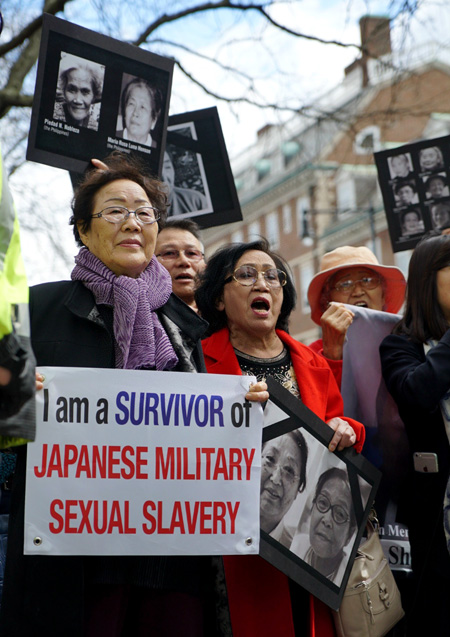Tokyo alliance 'mustn't undermine Beijing's interests or disturbAsia-Pacific region'
Beijing warned on Tuesday that the alliance between the United States and Japan shouldnot undermine China's interests or disturb the Asia-Pacific region.
The warning came as the two allies highlighted territorial issues and Japan's increasedsecurity role during Japanese Prime Minister Shinzo Abe's ongoing trip to the US.
US President Barack Obama welcomed Abe to the White House on Tuesday. Hailing thealliance as the "cornerstone" of security in the Asia-Pacific, the two countries vowed tocounter threats to "international order" by forging a trade deal and through an expandedsecurity role for long-pacifistic Japan.
Observers said the Obama administration's latest policy agenda shows that the US viewsChina's rising strategic influence in the region as an imminent challenge and that Tokyohas secured more tangible support from Washington during Abe's visit.
US Secretary of State John Kerry said on Monday at a joint news conference thatWashington's "commitment to Japan's security remains ironclad and covers all territoriesunder Japan's administration".
Agence France-Presse reported that Kerry clearly included China's Diaoyu Islands withinthe scope of Japan's administration.
Following a meeting of foreign policy and defense chiefs from both countries, the US andJapan announced new guidelines on Monday for bilateral defense cooperation.
Under these guidelines, revised for the first time since 1997, Japan will have the right toexercise collective self-defense — being allowed to defend not just its own territory, butalso the United States and other countries if needed.
Chinese Foreign Ministry spokesman Hong Lei said on Tuesday, "Both the US and Japanhave a duty to ensure that their alliance does not infringe the interests of third parties,including China, or the peace and stability of the Asia-Pacific region."
China's territorial sovereignty over the Diaoyu Islands and affiliated islets "remains intactno matter who makes remarks or (takes) action against them", he said. He also said theway in which the US-Japan treaty alliance, formed during the Cold War, develops"deserves attention from all parties".
Abe, the first Japanese leader to visit the US since 2006, was scheduled to address a jointsession of Congress on Tuesday.
Yang Bojiang, deputy director of the Institute of Japanese Studies under the ChineseAcademy of Social Sciences, said Washington is trying to champion its leadership over theregion through the evolving US-Japan agenda, and Japan's influence appears to haveincreased within the alliance.
"The US is trying to tie Japan tightly to its future strategies. ... Also, China's latest strategicproposals with regional influence — including the Asian Infrastructure Investment Bank—have impressed Washington," Yang said.
Ruan Zongze, vice-president of the China Institute of International Studies, said the US isadding weight to Japan's role in its global security strategy. Ruan said, "Washington'ssecurity policy support has sent a misleading signal to Abe — that he can gloss overJapan's historical issues."
Washington has said it takes no position over the sovereignty of the Diaoyu Islands. ButObama for the first time officially included the islands within the area of Japan'sadministration during a visit to Tokyo in April last year, which triggered protests fromChina.
During a meeting on Tuesday with students at Harvard's Kennedy School in Cambridge,Massachusetts, Abe drew criticism as he again defined "comfort women" — a euphemismfor Asian women forced by the Japanese Imperial Army into sexual slavery—as victims of"human trafficking".
In response to a student's question, Abe said, "It's heart-wrenching to think about womenwho fell victim to human trafficking and suffered unspeakable pain."


No comments:
Post a Comment